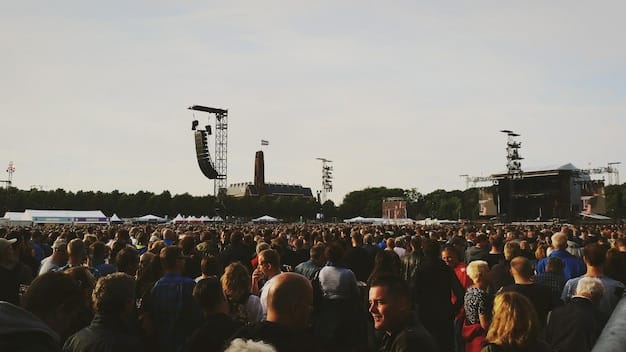Underground Rap and Social Activism: Music’s Role in Driving Change

Underground rap serves as a potent vehicle for social activism, amplifying marginalized voices and challenging societal norms through its raw, unfiltered expression.
Underground rap has long been more than just music; it’s a powerful platform for social commentary and activism. The genre provides a voice for the voiceless, tackling issues from systemic inequality to police brutality and political corruption.
The Roots of Underground Rap and Social Consciousness
The genesis of underground rap and its intertwining with social consciousness can be traced back to the socio-political landscape of the late 20th century. This music form emerged as a counter-narrative to mainstream narratives, providing a means for marginalized communities to express their experiences and challenge the status quo.
Early Influences and the Message Rap Conveyed
Early rap, even before it was clearly “underground,” was rooted in storytelling and observation. Artists like Grandmaster Flash and the Furious Five used their music to depict the realities of urban life, from poverty and crime to police brutality. These narratives were often raw and unfiltered, reflecting the lived experiences of their communities.
The Rise of Conscious Rap
As rap evolved, a subgenre known as “conscious rap” emerged. Artists like Public Enemy, KRS-One, and Queen Latifah began using their platforms to explicitly address social and political issues. Their lyrics challenged systemic inequality, promoted black empowerment, and encouraged critical thinking.
- Public Enemy: Known for their politically charged lyrics and revolutionary message.
- KRS-One: A teacher and philosopher who used rap to educate and inspire.
- Queen Latifah: A powerful voice for women in hip-hop, addressing issues of gender inequality and empowerment.
The underground rap scene served as a safe haven for artists who felt constrained by the commercial pressures of the mainstream music industry. It allowed them to experiment with different sounds and lyrical content, pushing the boundaries of what rap could be.

This section underscores the importance of roots and early influences in shaping rap’s social face in subsequent years.
Underground Rap as a Voice for the Voiceless
Underground rap provides a platform for voices that are often marginalized or ignored by the mainstream media. This genre amplifies the experiences of communities facing systemic inequality, oppression, and social injustice. It gives visibility to struggles, realities, and perspectives that are often overlooked.
Addressing Systemic Inequality
Many underground rap artists use their music to expose and critique systemic inequality. They address issues such as racial discrimination, economic disparities, and unequal access to education and healthcare. By highlighting these injustices, they aim to raise awareness and inspire action.
Championing Marginalized Communities
Underground rap often gives voice to marginalized communities, including LGBTQ+ individuals, people with disabilities, and undocumented immigrants. These artists share their stories, challenge stereotypes, and advocate for equality and inclusion. They provide a sense of community and solidarity for those who feel isolated or unheard.
Directly Addressing Social Injustice
Underground rap provides a direct and unfiltered commentary on social injustices that impact certain communities. It uses its music to call out specific instances of injustice, such as police brutality, mass incarceration, and discriminatory policies.
- Police Brutality: Speaking truth to power and demanding law enforcement accountability.
- Mass Incarceration: Challenging the prison-industrial complex and advocating for justice system reform.
- Discriminatory Policies: Critiquing policies that perpetuate inequality and marginalize communities.
In this section we are providing a comprehensive overview of how underground rap is a voice of voiceless.

The Role of Music in Driving Change
Music can be a powerful tool for social change, and underground rap has proven to be no exception. The genre has inspired activism, fostered dialogue, and mobilized communities. It has been used to raise awareness, challenge norms, and advocate for policy changes.
Inspiring Activism
Underground rap inspires activism by providing a soundtrack for social movements. Its lyrics and message resonate with those who are working to create a more just and equitable world. The music can energize and motivate activists, providing a sense of solidarity and purpose.
Fostering Dialogue and Public Discourse
Underground rap fosters dialogue by creating a space for open and honest conversations about difficult topics. Its lyrics challenge listeners to think critically about social issues and to question their own biases and assumptions. The music can spark debates and discussions that lead to greater understanding and empathy.
Mobilizing Communities and Promoting Social Justice
Underground rap mobilizes communities by bringing people together around shared values and goals. Its concerts and events provide a space for activists, artists, and community members to connect and collaborate. The music can create a sense of collective identity and empower people to take action.
Fundraising and Awareness
Beyond its artistic expression, underground rap has been instrumental in raising funds and awareness for social causes. Benefit concerts, charity albums, and direct donations have become common ways for artists and fans to support organizations working on issues they care about.
- Benefit Concerts: Raising funds for charitable causes through live performances.
- Charity Albums: Donating proceeds from album sales to support specific organizations.
- Direct Donations: Engaging fans to contribute directly to causes through online platforms.
This section highlights music’s role in driving social change, showcasing its ability to motivate activism.
Notable Underground Rap Artists and Their Impact
Many underground rap artists have made significant contributions to social activism. These artists have used their music to raise awareness about important issues, challenge oppressive systems, and inspire change. Here are a few notable examples.
Immortal Technique
Known for his politically charged lyrics and critiques of government corruption, Immortal Technique has been a vocal advocate for social justice. His music often explores themes of poverty, inequality, and revolution.
Brother Ali
Brother Ali addresses issues of racism, classism, and social inequality. He has been a strong supporter of the Black Lives Matter movement and other social justice causes. Brother Ali has earned respect for his honesty and commitment to social commentary.
Kendrick Lamar
Kendrick Lamar’s socially conscious lyrics have made him an important voice in contemporary rap. He examines complex issues such as identity, faith, and social responsibility. His album “To Pimp a Butterfly” is considered a modern classic for its exploration of racial identity and social injustice.
Run the Jewels
Run the Jewels combines thought-provoking lyrics with hard-hitting beats to address social and political issues. They are known for their outspoken criticism of police brutality, economic inequality, and corporate greed. Run the Jewels has also been involved in various charitable initiatives, using their platform to support marginalized communities.
- Activism: Their outspoken criticism of systemic issues.
- Impact: They resonate strongly with younger, politically active audiences.
- Charitable Initiatives: Supporting marginalized communities.
This section has highlighted notable underground rap artists, showcasing their immense impact.
Challenges and Criticisms
Despite its positive contributions, underground rap and social activism face several challenges and criticisms. These include issues of authenticity, commercialization, and the potential for violence or negativity in lyrics. A balanced perspective requires acknowledging these challenges alongside the positive aspects.
The Question of Authenticity
Some critics question the authenticity of certain underground rap artists, particularly those who gain mainstream success. They argue that these artists may be diluting their message or pandering to commercial interests.
Commercialization and Its Effects
The commercialization of underground rap can also be seen as a challenge. As artists gain popularity and sign with major labels, they may face pressure to compromise their artistic vision or to conform to industry standards.
Overcoming Negative Stereotypes and Promoting Positive Change
Underground rap sometimes faces criticism for portraying negativity or violence in its lyrics. These concerns are that such content can perpetuate harmful stereotypes or promote harmful behavior. This makes creating a positive change difficult.
- Stereotypes: Defying pre-conceived notions.
- Positive Change: Promoting messages of hope, healing, and empowerment.
- Social Responsibility: Artists taking responsibility for the messages they convey.
It is important to recognize them in order to strengthen and refine the transformative impact of underground rap.”
The Future of Underground Rap and Social Activism
The future of underground rap and social activism looks promising. As technology evolves and social movements gain momentum, underground rap will continue to play an important role in driving change. The genre will likely adapt to new platforms and technologies, reaching wider audiences and amplifying its message.
The Impact of Technology and Online Platforms
Technology and online platforms have revolutionized the way underground rap artists create, distribute, and promote their music. Social media, streaming services, and online communities have leveled the playing field, allowing independent artists to reach global audiences without the need for traditional gatekeepers.
Collaboration and Cross-Cultural Exchange
The future of underground rap and social activism will likely involve greater collaboration and cross-cultural exchange. Artists from different backgrounds and regions will come together to share their stories, challenge stereotypes, and advocate for social justice.
Continuing the Legacy and Amplifying Voices for a Better Future
As the world becomes increasingly interconnected and complex, the role of underground rap in social activism will become even more critical. The genre serve as a powerful tool for amplifying marginalized voices, challenging oppressive systems, and inspiring change.
- Legacy: Honoring the history of rap as a vehicle for social change.
- Amplifying Voices: Providing a platform for those who are often unheard.
- Better Future: Working together to create a more just and equitable world.
As underground rap evolves, it is important for artists, fans, and communities to work together to ensure that music remains a force for good. By supporting and empowering underground rap artists, we can help build a more just and equitable world for all.
| Key Point | Brief Description |
|---|---|
| 🎤 Voice for Voiceless | Underground rap amplifies marginalized voices, addressing systemic inequality. |
| ✊ Inspiring Activism | It inspires action by providing a soundtrack for movements. |
| 🌐 Online Platforms | Technology helps artists reach wider audiences without needing gatekeepers. |
| 🤝 Collaboration | Cross-cultural exchange enhances impact. |
FAQ
▼
Underground rap is characterized by its independence from mainstream labels, often focusing on socially conscious or experimental themes. It emphasizes raw, unfiltered expression and community relevance.
▼
It serves as a platform for marginalized voices, addressing issues like systemic inequality, police brutality, and political corruption. The music inspires activism. It fosters awareness and change.
▼
Artists like Immortal Technique, Brother Ali, Kendrick Lamar, and Run the Jewels use their music to tackle social and political issues. They contribute to ongoing conversations.
▼
Challenges include maintaining authenticity, mitigating the impact of commercialization, and addressing criticisms related to negative stereotypes or violence in lyrics. These are important to tackle.
▼
The future looks promising, with technology enhancing its reach. Collaboration amplifies the message. It continues to be a tool for change and advocacy in communities worldwide.
Conclusion
In conclusion, underground rap’s role in social activism is undeniable, acting as a catalyst for change and a voice for the unheard. As technology continues to evolve, the genre’s influence will only grow, solidifying its place as a powerful force in shaping social consciousness and driving meaningful progress.





